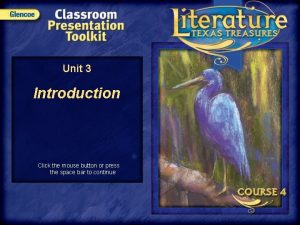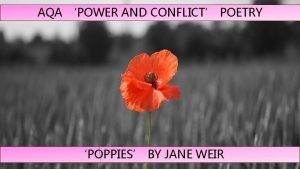POWER CONFLICT POETRY Poem Poet Content Context in

- Slides: 1

POWER & CONFLICT POETRY Poem & Poet Content (Context in bold) Ozymandias Percy Shelley 1817 Narrator meets a traveller who tells him about a statue in the middle of the desert. The statue is of an ancient & cruel ruler from a past civilization – Pharaoh Ramesses II. The poem is about the temporary nature of power. Ultimately, power will fade, art cannot immortalise power & nature will be long-lasting. London William Blake 1794 Narrator describes a walk around London & comments on the despair & misery that he sees. Blake was influenced by the French Revolution & wanted social & political equality. He wanted the people to rise up against the powerful ( church, monarchy) & in turn emancipate (liberate/free) themselves. The Prelude: Stealing the boat William Wordsworth 1850 This is only an extract of the poem & is autobiographical. It is about an over confident narrator who finds a boat & takes it out on the lake. Although confident to begin with & enjoying the scenery, the narrator sees the mountain appear on the horizon & is overwhelmed with its size & power. It causes the narrator to retreat & change his view of nature, he now realises its power. Wordsworth was a romantic poet (Romantics challenged people about they way they thought. They also saw the power of nature over mankind. ) My Last Duchess Robert Browning 1842 A Duke is showing a visitor a portrait of his Duchess ( former wife) who is now dead. Whilst observing the painting he tells the visitor that the Duchess was flirtatious & displeased him. As he speaks we realise that the Duke is insanely jealous & probably had the Duchess killed. We learn at the end of the poem that the visitor has come to arrange the Duke’s next marriage & is representing the woman he is set to marry. Poem based loosely on the real Duke of Ferrara. The Charge of the Light Brigade Alfred Tennyson 1854 A tribute to the British cavalry ( soldiers on horseback) who died during the Crimean War. Basically, the men were given an incorrect order to charge into battle & with swords, & meet the Russian enemy, who were armed with guns. The cavalry were defenceless- yet still fought bravely. Exposure Wilfred Owen 1917 -1978 An authentic poem based on Owens’ own experience on the front line. It was a horrendous winter & the men are subject not to enemy attacks but to the brutality of nature. Nature is personified as the main enemy & the men can only wait to die. It is an anti-war poem & stresses the insignificance of man compared to nature. During the Somme, over 60, 000 British soldiers died in one night. Storm on the Island Seamus Heaney 1966 The narrator describes how a community are waiting to be hit by a storm. It is obvious that they have been hit before because of the landscape of the island (houses squat). The narrator starts off confident but as the storm hits the power of the storm creates feelings fear & trepidation. . Heaney grew up in a farming community in Ireland; much of his poetry uses agricultural/natural images. Bayonet Charge Ted Hughes 1957 The poem focuses on a single solder’s experience of a charge towards enemy lines. It describes his thoughts & actions as he tries to stay alive. It is clear that the solder is not ready for the charge & could have been sleeping. The soldier fears for his life & the patriotic ideals that encouraged him to fight have gone. Hughes was a former RAF serviceman & often look at man’s impact on nature. Remains Simon Armitage 2008 Based on the account of a British soldier who served in Iraq, first published in a series of interviews by Channel 4 called ‘The Not Dead’. . A group of soldiers shoot a man who’s running away from a bank raid. His death is described in graphic detail & the soldier who is telling the story can’t get the death of the man out of his head. He didn’t know if the man was armed or not & the reader gets the impression that it was not an isolated incident. Poppies Jane Weir 2009 A mother describes her son leaving home, seemingly to join the army. The poem is about the mother’s emotional reaction losing her son to the war. She fears for his safety & after he leaves her she goes to a familiar place that reminds her of him. Weir is a textile artist as well as poet & textiles feature heavily here. War Photographer Carol Ann Duffy 1985 A war photographer is in his darkroom, developing pictures that he has taken in different warzones. As the pictures develop he recalls the death of one man & remembers the cries of his wife. The photographer contrasts his experiences to rural England & focuses on people who do not seem to care about war torn places. Duffy was inspired to write this poem by her friendship with a photojournalist. Poem & Poet Tissue Imtiaz Dharker 2006 About The poem uses tissue as an extended metaphor for life. She describes how life, like tissue is fragile. However, she also discusses some of the literal uses of paper that are intertwined with our lives, such as recording names in the Koran- She then goes onto to discuss how we are made from tissue ( living tissue which is our skin) emphasising that life is fragile. Dharker has Pakistani origins & was raised in Glasgow. Many of her poems looks at issues of identify. The Emigrée The speaker speaks about a city that she left as a child. The speaker has a purely positive view of the city. The city she recalls has since changed, perhaps it was scene of conflict, however, she still protects the memory of her city. The city may not be a real place but represent a time, emotion perhaps the speaker’s childhood. According to Ben Wilkinson (critic), Rumens has a ‘fascination with elsewhere. ’ Carol Rumens 1993 Kamikaze Beatrice Garland 2013 Kamikaze is the unofficial name given to Japanese pilots who were send on a suicide mission. The mission was considered one of honour but this poem is about a pilot who aborted the mission. Hi daughter imagines that her father was reminded of his childhood & the beauty of nature & life whilst on the mission. When he returned home he was shunned. Checking Out Me History John Agard 2007 The narrator discusses his identity & emphasises how identity is closely linked to history & understanding your own history. In school he was taught British history & not about his Caribbean roots to which he feels resentful. He mocks some of the pointless things he was taught & contrasts the nonsense topics with admirable black figures. The Example question: Compare the ways poets present ideas about nature in ‘Exposure’ & in one other poem from the Power & Conflict cluster. INFO q 45 minutes q 1 task only- no choice of question q 1 poem printed Actions: Step 1: Read & highlight the key words of question Step 2: Decide on one poem to compare to Step 3: Write quotes you want to use from your chosen poem & connect them to quotes from the printed poem. Step 4: Write the essay: intro/PEE on one poem – connective- PEE on next poem/ Repeat Step 6: Conclusion Assessment Objectives A 01 - Demonstrate an understanding of the question & poems, use quotations to evidence understanding. Ensure comparisons are made between poems & made throughout your response. 12 marks available A 02 - Carefully analyse the language used by the poet & comment on the intended effect on the reader. Ensure that you include subject terminology in your response. Comment where you can on structure/form 12 marks available A 03 - Show understanding of the relationships between poems & acknowledge the contexts ( time) in which they were written & think about how this aids your understanding 6 marks available. Subject Terminology terminology Alliteration Assonance Autobiographical Authentic Blank verse Caesura (plural caesurae) Colloquial language Dramatic monologue Emotive Enjambment Euphemism -“all smiles stopped” First person Form Free verse Half rhymes Iambic pentameter Imagery In medias res Internal rhyme Irony Juxtaposition Language Layout Metaphor Monologue Mood Narrative Onomatopoeia Anaphora Oxymoron Personification Sonnet Phonetic spellings Plosive Rhetorical question Rhyming scheme Rhyming couplet Rhythm Sibilance Simile Stanza Verse Structure Symbolism Voice Tone Volta Epic poem Cliché Hyperbole Semantic field Protagonist Chorus Narrative Syllable Repetition Themes Power of Nature: Ozymandias, The Prelude, Exposure, Storm on the Island, Tissue & Kamikaze. Power of humans: Ozymandias, London, My Last Duchess, Tissue, Checking Out Me History. Effects of conflict: The Charge of the Light Brigade, Exposure, Bayonet Charge, Remains, Poppies, War Photographer, Kamikaze. Reality & brutality of conflict: The Charge of the Light Brigade, Exposure, Bayonet Charge, Remains, War Photographer. Loss & Absence: London, Exposure, Poppies, The Emigree, Kamikaze. Memory: The Prelude, My last Duchess, Remains, Poppies, War Photographer, The Emigree, Kamikaze. Place: London, The Prelude, The Emigree, Kamikaze. Identity: My Last Duchess, The Charge of the Light Brigade, Poppies, Tissue, The Emigree, Kamikaze, Checking Out Me History. Individual Experiences: London, The Prelude, Bayonet Charge, Remains, Poppies, War Photographer, The Emigree, Kamikaze. Bravery: Exposure, Bayonet Charge, The Charge of the Light Brigade. Comparing Contrasting Comparing Connectives connectives Contrasting connectives Likewise In the same way Similarly Equally Likewise As with However Whereas On the other hand Conversely Alternatively Although Stretch yourself Be original, develop your own interpretations; Be critical, give your own justified opinions; Develop your ideas on context- what effect does have on the poem & your understanding?

